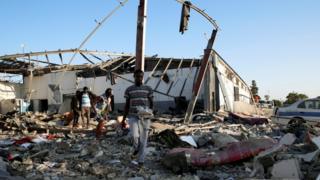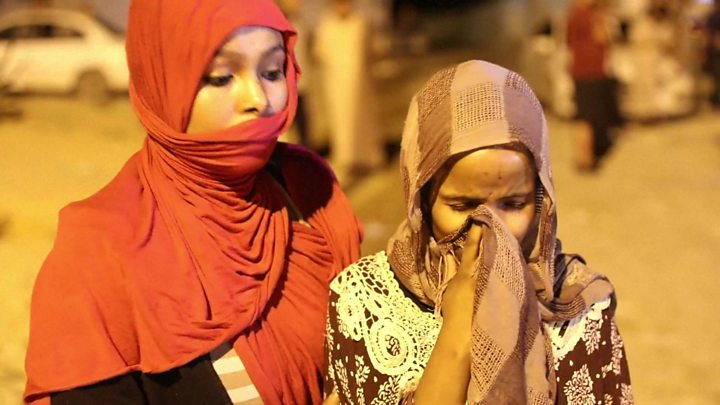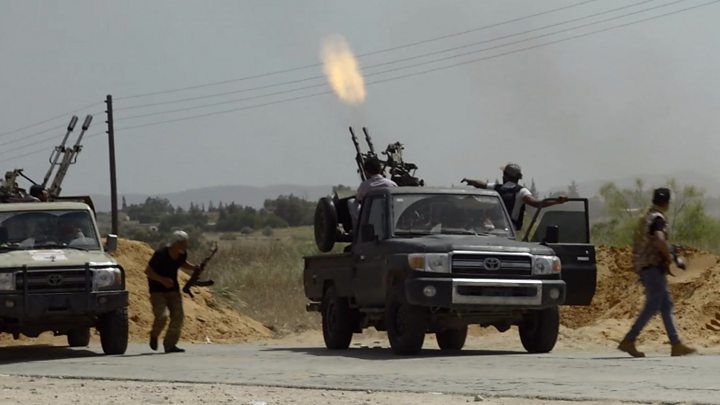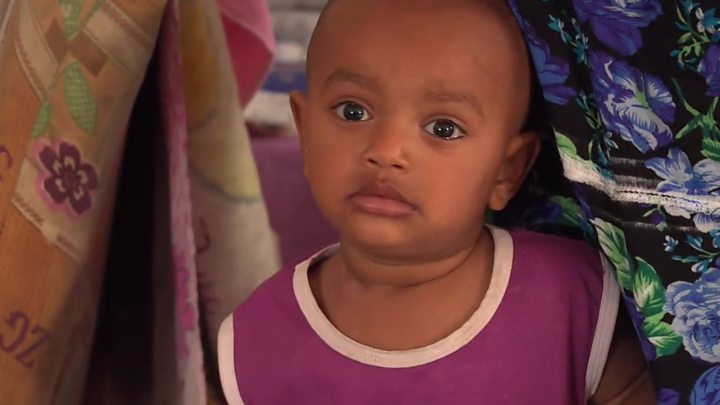Libya migrants ‘fired on after fleeing attack’
The UN says it has received reports that guards fired on migrants who tried to flee air strikes on a detention centre near Libya’s capital Tripoli on Tuesday.
The UN says it believes at least 53 migrants died and 130 were hurt in the air strikes on the Tajoura centre.
UN High Commissioner for Human Rights Michelle Bachelet has said the air strikes could constitute a war crime.
The government and an opposing militia have blamed each other for the attack.
Thousands of migrants trying to reach Europe, many of them sub-Saharan Africans, are being held in Libyan detention camps.
Libya has been torn by violence and division since long-time ruler Muammar Gaddafi was deposed and killed in 2011.
A recent upsurge in violence began in April when the self-styled Libyan National Army (LNA), commanded by Gen Khalifa Haftar, launched an offensive against the UN-backed Government of National Accord (GNA), led by PM Fayez al-Sarraj.
What does the latest UN report say?
The latest situation overview from the UN Office for the Coordination of Humanitarian Affairs raised the number of reported deaths at the centre to 53, with six children among those killed and bodies still being pulled from the rubble.
“There are reports that following the first impact, some refugees and migrants were fired upon by guards as they tried to escape,” it states, without giving any further details.
A UN mission visited the camp on Wednesday and helped evacuate the injured but said there had been “no general relocation of the remaining refugees and migrants” and that some 500 people faced “the same degree of vulnerability and exposure to violence”.
The report added: “Humanitarian actors call for the immediate release of refugees and migrants from detention centres and for relocation to safe shelter.”
The Libya Observer quoted Interior Minister Fathi Bashagha as saying the government was now considering closing all detention centres and releasing all migrants.
What do we know about the attack?
It took place late on Tuesday.
The latest UN report says the camp was “apparently struck twice, with one missile hitting an unoccupied garage and another hitting a hanger which contained some 120 refugees and migrants”.
It added: “The number of civilian casualties caused by the conflict (since April) has almost doubled as the result of this single attack.”
An official in the Libyan health ministry, Dr Khalid Bin Attia, told the BBC after the attack: “People were everywhere, the camp was destroyed, people are crying, there is psychological trauma, the lights cut off… it was horrible, blood is everywhere.”
Meanwhile, two migrants who survived the attack told Associated Press they had been forced for months to work for a local militia in a nearby arms workshop.
Who is to blame for the attack?
The GNA accused the LNA of carrying out “heinous, premeditated, precise” air strikes.
The LNA said its warplanes had bombed a pro-government camp near the centre and pro-government forces had fired shells in response, hitting the migrant centre by accident.
The UN has not been able to confirm who was behind the attack but said it “could constitute a war crime”.
Why is there war in Libya?
No authority has full control over Libya and the country is extremely unstable, torn between several political and military factions, the two most important of which are led by PM Sarraj and Gen Haftar.
The general has been active in Libyan politics for more than four decades and was one of Gadaffi’s close allies until a dispute in the late 1980s forced him to live in exile in the US.
After returning to Libya when the uprising began in 2011, he built up a power base in the east and has won some support from France, Egypt and the UAE.
How vulnerable are migrants in Libya?
People-smuggling gangs have flourished in Libya’s political chaos, charging desperate migrants from sub-Saharan Africa thousands of dollars per head.
Human rights groups have highlighted the poor conditions at the detention centres where many migrants end up as the EU works with the Libyan coastguard to intercept migrant boats.
Italy has taken a hard-line stance of closing its ports to humanitarian rescue boats, accusing them of aiding people smugglers. Instead, it wants to return any migrants found in open water to Libya – where most end up in detention centres.
Following Italy’s objections, the wider EU proposed a compromise solution of setting up EU “assessment centres” in countries like Libya, where applications for asylum could be processed on foreign soil in a bid to break up the smuggling operations.
Source: Read Full Article






